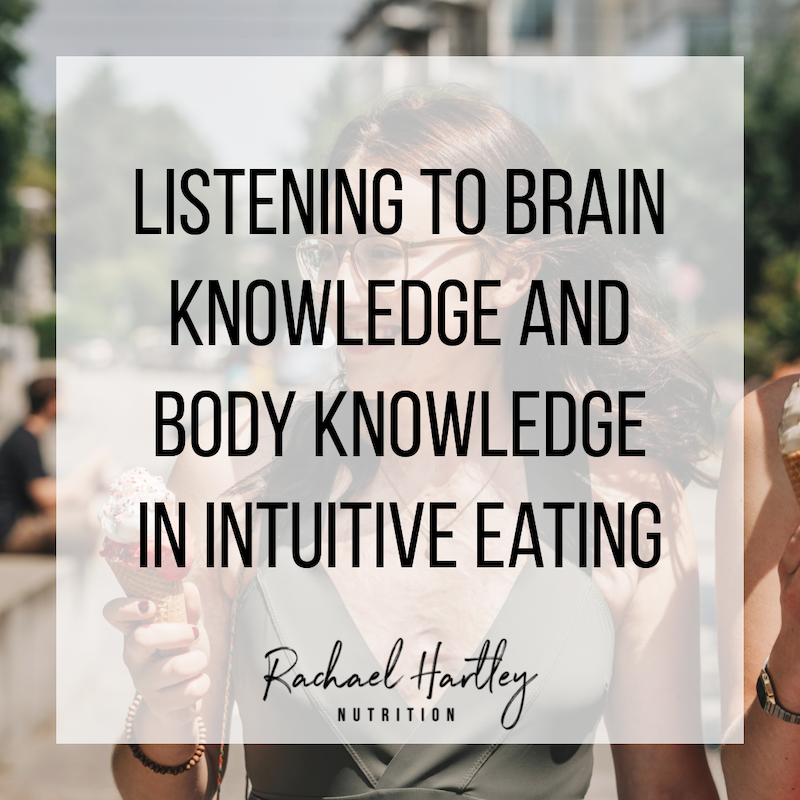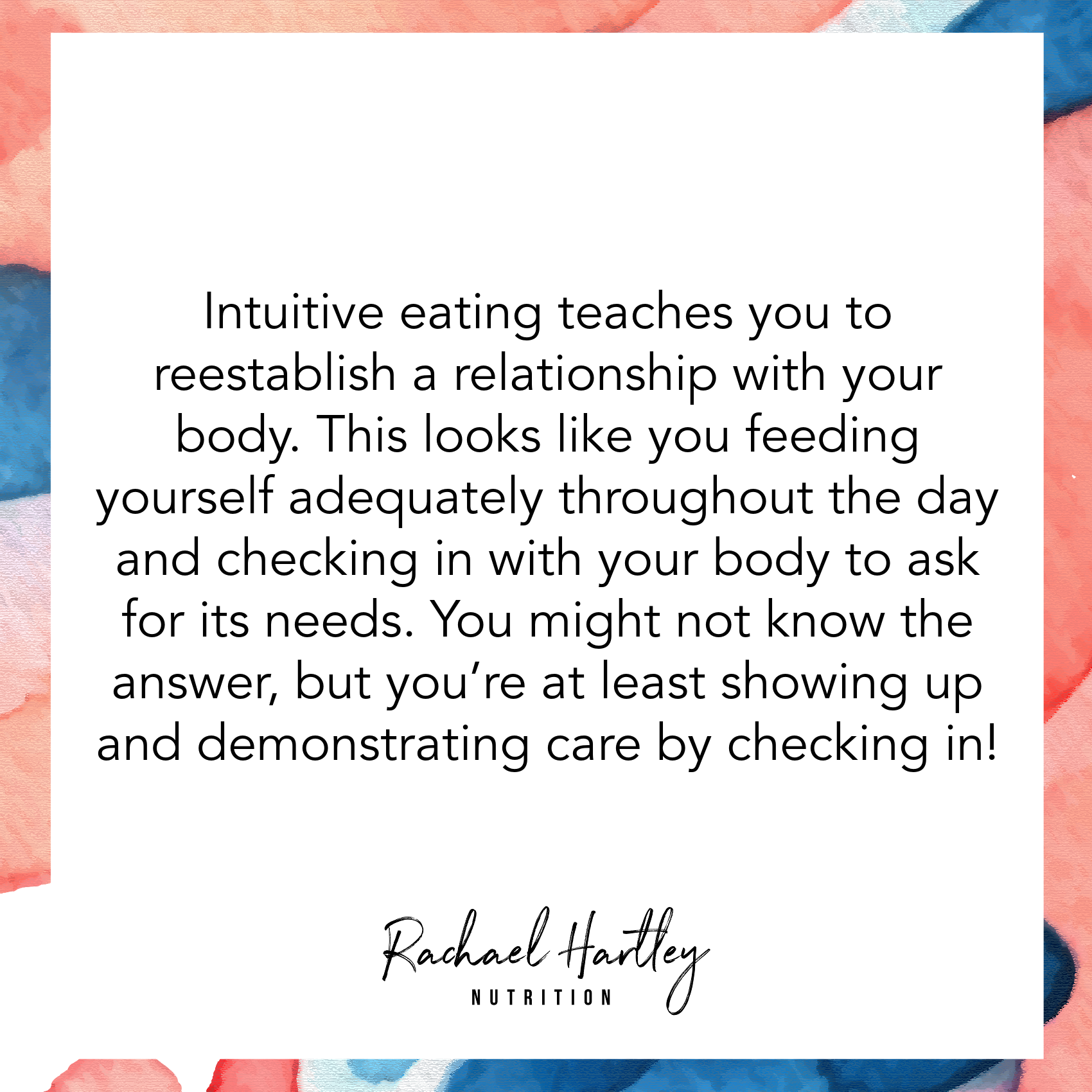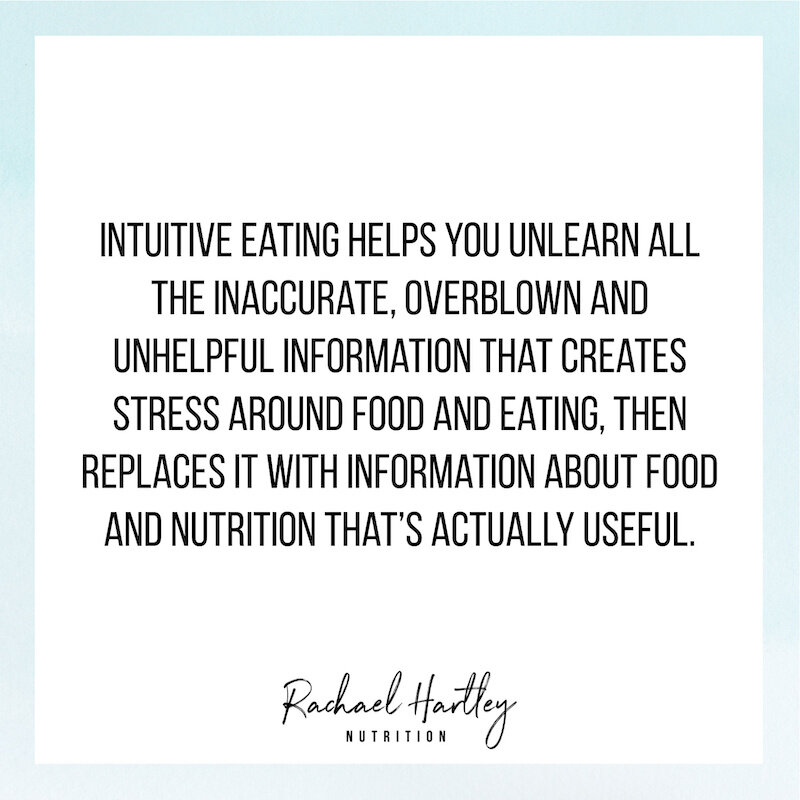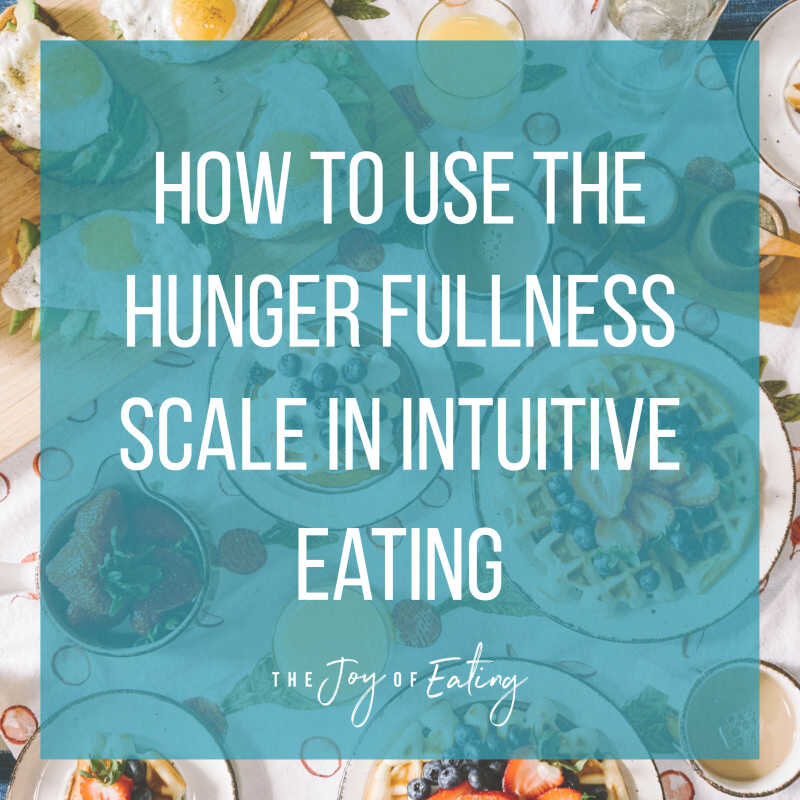Listening to Your Body and Brain Knowledge in Intuitive Eating
Intuitive eating isn’t impulsive eating. This blog post explores how you can listen to your body and brain knowledge together in intuitive eating to make intentional choices with food that help you feel good physically and mentally.
Sometimes when people first learn about intuitive eating, they think of it as impulsive eating.
There’s a common myth that intuitive eating is just eat what you want, anytime you want. That myth is a big reason why so many people fear that if they try to eat intuitively, they’ll get out of control with food. They imagine themselves immediately reacting to any thought of chocolate, donuts, and pizza, and life will be a never ending smorgasbord of eating all those previously off-limits foods.
Now, don’t get me wrong. With intuitive eating, you do have the permission to eat whatever you want, when you want. But the key word here is permission. Intuitive eating also helps you build skills and connect to your body to help make intentional choices with food rather than impulsive ones. Intuitive eating is grounded in listening to your body, but also teaches you to listen to your brain - a brain that isn’t filled with diet culture’s nonsense about food and eating.
Now, let’s talk listening to your body and brain knowledge in intuitive eating, and how you can use both these sources of information together.
Listening to Your Body Knowledge in Intuitive Eating:
Body knowledge consists of hunger and fullness cues, food preferences, cravings, and how food makes you feel. Essentially, it’s the information you gain by listening to your body and understanding what it’s trying to tell you.
It’s obvious in hindsight, but one thing I like to remind my clients in that your body’s job is to try and keep you alive. Everything it does, even the things you don’t like very much, are for a very good reason. While our body’s messaging system can certainly “misfire” under certain circumstances, for the most part, overall it will lead you towards feeding your body adequately and appropriately with a wide variety of foods, some more fun and others more fueling.
Now, when I talk about listening to your body, I know a lot of you out there are scratching your head and thinking, “uhhh but what if it’s not talking?” Many people are quite disconnected from their body, especially those who have experienced trauma, extreme stress, gastrointestinal disease or other conditions that cause chronic pain and discomfort. While that disconnection can be extremely frustrating when one is trying to practice intuitive eating, it’s helpful to remember that it started as a survival mechanism - a way of protecting yourself when embodiment didn’t feel safe.
I like to use a simple analogy to help clients reconnect with their body. Imagine your body is a friend that you’ve lost touch with over time. They kept calling you, trying to keep the relationship going, but for whatever reason you didn’t pick up the phone. So, they stopped calling. Now you want to reestablish the relationship. You realize you were a crappy friend, so It’s your turn to pick up the phone! You ask them what’s going on in their life and show up for them as a friend by taking actions that show you care.
In intuitive eating, this looks like you feeding yourself adequately throughout the day and checking in with your body to ask for its needs. You might not know the answer, but you’re at least showing up and demonstrating care by checking in! One way I have clients practice this is by checking in with their body at times throughout the day, and completing a brief body scan to see what their body might need. I encourage going beyond just checking with hunger and fullness cues. You body might need a snack. Or maybe it needs fuzzy socks for cold feet and a bathroom break. Honoring all your needs is a way to listen to your body and build embodiment.
Of course, this waaaaay oversimplifies the process of connecting with your body. If you want to read more, there’s some really helpful books you can dive into, including The Body Keeps The Score, Stephen Porges work, and Bodyfulness (haven’t read but have heard good things!).
Listening to Your Brain Knowledge in Intuitive Eating:
While intuitive eating is grounded in listening to your body, when your brain isn’t filled with diet culture’s BS, your knowledge about food can also be helpful in making food choices. Intuitive eating helps you unlearn all the inaccurate, overblown and unhelpful information that creates stress around food and eating, then replaces it with information about food and nutrition that’s actually useful.
One example of brain knowledge in intuitive eating is nutrition knowledge. As my colleague Christine Byrne shared just yesterday, “Intuitive eating isn’t about erasing nutrition science. It’s about erasing all of the guilt, shame, obsession, food morality, anti-fatness, and disordered eating behavior that nutrition science (and nutrition scientists) has played a part in perpetuating.” As I explored in my book (obligatory reminder to grab a copy if ya haven’t!), it is absolutely possible to think about nutrition in a way that isn't centered on weight control, but instead on feeling good or managing a health condition.
Ethical beliefs about food are another piece of brain knowledge. Perhaps you have certain ethical beliefs about animal welfare, food worker rights, the environment, etc. It’s possible that these ethical beliefs don’t always align with what your body wants. You can still integrate these beliefs into your choices in a way that honors your brain and body.
Another example of brain knowledge that’s easy to overlook is knowledge of what you have going on that day. Having an understanding of your schedule is essential for making food decisions! Sometimes you might have to eat more or less than what you might want, or eat different foods than what you might want, based on activities you have planned later on.
Listening to Your Body AND Brain in Intuitive Eating:
Here's a few examples of what it might look like to listen to your body AND brain knowledge in intuitive eating:
Craving a bowl of pasta, but making yourself a dish that has some veggies and/or whole grains in it, because you haven’t pooped in a couple days and you know you could use the fiber.
Eating to the point of being a bit overly full because you have a few classes in a row and won’t have a chance to eat for awhile.
Eating a little less than you’d like because you’re going to a yoga class shortly, and don’t want to feel barfy in down dog.
Having a meal or snack when you’re not hungry because you’re in eating disorder recovery and trying to establish a consistent pattern of eating.
Grabbing a frozen pizza or takeout or a microwave meal that you’re not necessarily in the mood for, but you know you have a late night at work and convenient fuel seems more appealing than the thing you want to eat, but takes time in the kitchen.
Using tofu or “chickn” (which you enjoy) in a stir fry instead of chicken (which your taste buds prefer) because you’re trying to cut back on animal proteins for environmental reasons.
Making a burger at home instead of eating a fast food burger you love because you feel passionate about supporting businesses that pay a livable wage.
Trying to use olive oil instead of butter more often, even though you prefer the latter, because you have high cholesterol.
Note: Some of these examples may not connect with you and your situation. Others could feel restrictive. Because everyone has a different relationship and history with food, things that feel restrictive for one person can feel supportive for another. Please know these are simply examples, not choices you should be making.
There are a few things to notice about these examples. First, none of them include binary thinking about food. It’s not either or, but instead negotiating a middle ground in situations where your body and brain aren’t in alignment. Another thing to notice is that in all these examples, there’s no forcing yourself to eat foods you hate, or not eat foods you love. Finally, and most importantly, the goal isn't shrinking your body, but rather fueling your body.
Keep in mind that for the most part, before intentionally practicing integration of brain and body knowledge it’s probably helpful to have some time and experience allowing yourself to eat previously off-limits foods. When you’re in the honeymoon phase, it’s pretty normal to be a bit impulsive with food, and that’s OK! However, if you’re new to intuitive eating, I hope reading this is helpful for you in understanding the possibilities that come with fostering a practice. Remember, your brain is part of your body. As long as it's thinking independently of diet culture, it can be trusted.
If this blog post on listening to your body and brain knowledge in intuitive eating was helpful, follow my intuitive eating board on pinterest for more non-diet support.
This post on listening to your body and brain knowledge in intuitive eating was originally published May 2018. It has been updated to give you the best possible content.








